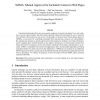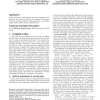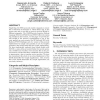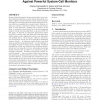CCS
2008
ACM
14 years 2 months ago
2008
ACM
A well-known concern in the setting of identity based encryption is that the PKG is all powerful and has to be completely trusted. To mitigate this problem, the notion of Accounta...
CCS
2008
ACM
14 years 2 months ago
2008
ACM
We present FairplayMP (for "Fairplay Multi-Party"), a system for secure multi-party computation. Secure computation is one of the great achievements of modern cryptograp...
CCS
2008
ACM
14 years 2 months ago
2008
ACM
Role Engineering is a security-critical task for systems using role-based access control (RBAC). Different role-mining approaches have been proposed that attempt to automatically ...
CCS
2008
ACM
14 years 2 months ago
2008
ACM
Cross-Site Request Forgery (CSRF) is a widely exploited web site vulnerability. In this paper, we present a new variation on CSRF attacks, login CSRF, in which the attacker forges...
CCS
2008
ACM
14 years 2 months ago
2008
ACM
Unrestricted information flows are a key security weakness of current web design. Cross-site scripting, cross-site request forgery, and other attacks typically require that inform...
CCS
2008
ACM
14 years 2 months ago
2008
ACM
CCS
2008
ACM
14 years 2 months ago
2008
ACM
Usage control is a generalization of access control that also addresses how data is used after it is released. We present a formal model for different mechanisms that can enforce ...
CCS
2008
ACM
14 years 2 months ago
2008
ACM
Single-Sign-On (SSO) protocols enable companies to establish a federated environment in which clients sign in the system once and yet are able to access to services offered by dif...
CCS
2008
ACM
14 years 2 months ago
2008
ACM
System-call monitoring has become the basis for many hostbased intrusion detection as well as policy enforcement techniques. Mimicry attacks attempt to evade system-call monitorin...
CCS
2008
ACM
14 years 2 months ago
2008
ACM
The Unified Model (UM) key agreement protocol is an efficient Diffie-Hellman scheme that has been included in many cryptographic standards, most recently in the NIST SP 80056A sta...




